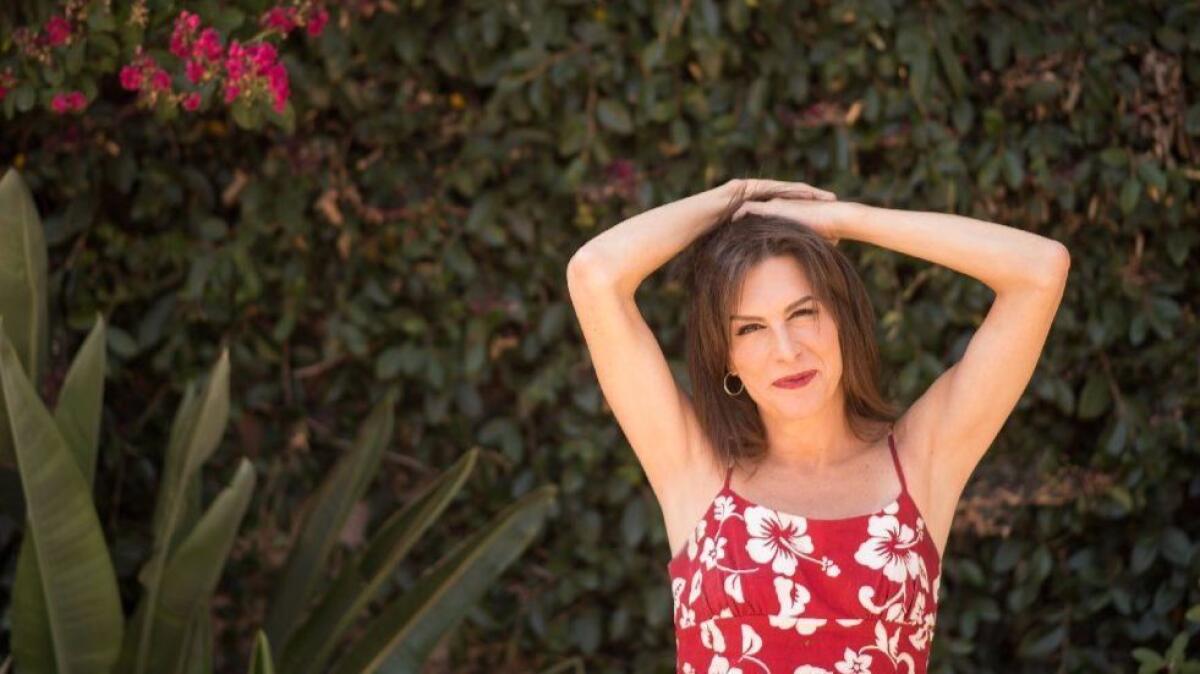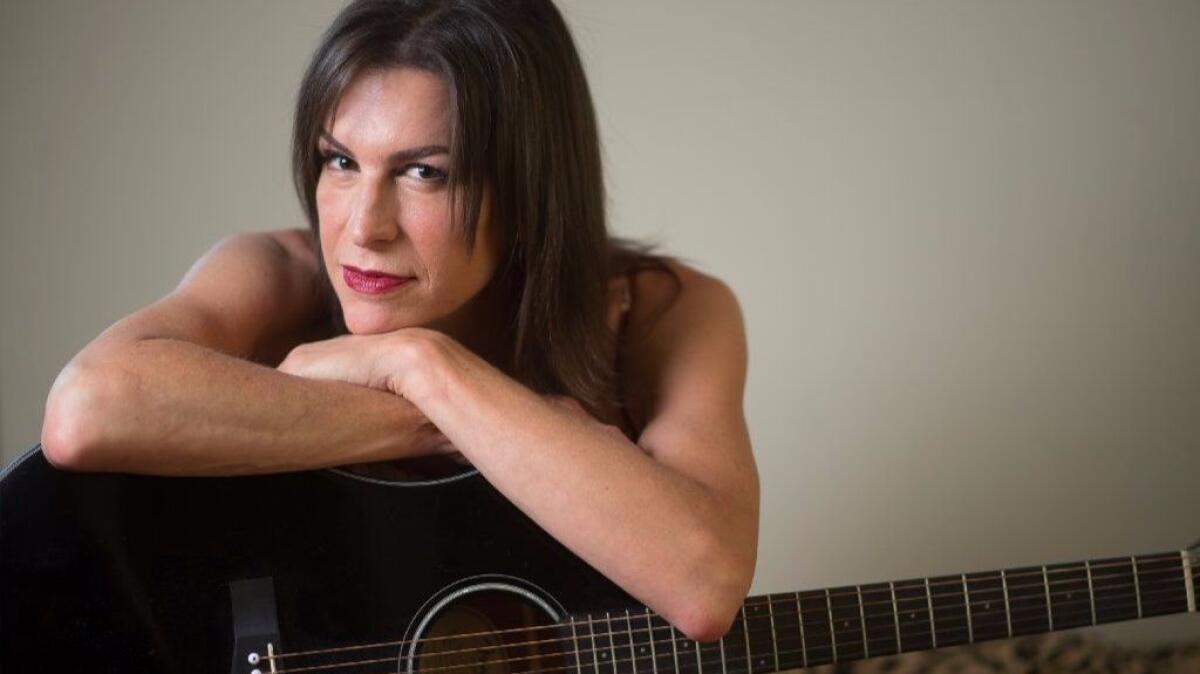(In)Visible: Rachel Crowl represents how transgender actors have been sidelined from their own stories

- Share via
From an outsider’s perspective, Rachel Crowl had achieved success as a working actor. She’d ascended the ranks of a prestigious New York City-based theater company, playing lead roles in several off-Broadway productions including “Henry V” and “The Importance of Being Earnest,” and helped start another company while landing a steady theatrical contract, which proffered a reliable arena to pursue the craft that she fondly refers to as her “first love.” She was performing in eight shows per week and starting to settle into a marriage to a thoughtful, incisive nonfiction writer.
But while she’d long before come to terms with her identity as a woman (a journey that her wife, Helen Boyd, chronicled in several memoirs about their relationship), to the rest of the world, she appeared to be — at least, physically — a man.
She’d wrestled with the idea of transitioning, changing her gender presentation to align with her internal sense of gender identity, but she realized that opportunities for trans actors were, essentially, nonexistent.
“I figured I could either play a dead hooker that the cops made a ‘meat and potatoes’ joke about, or I could play a live hooker that the cops made a ‘meat and potatoes’ joke about,” Crowl said. “And there really was nothing else.”
So, in 2005, when Crowl finally decided to transition, she was prepared to settle a sort of bartering deal with the universe: her acting career, in exchange for a decent quality of life.
For almost 12 years, the universe seemed to hold up its end of the bargain. In lieu of acting, Crowl dove into a whole arsenal of backlogged creative interests — photography, music, filmmaking, animating. She and her wife abandoned New York City altogether, relocating to rural Wisconsin to work as professors at a small liberal arts university.
And while Crowl truly believed that acting was what she “was put on this Earth to do,” she’d accepted that, perhaps, it just simply wasn’t a feasible reality for her anymore.
“Well, evidently, the universe has re-negotiated its contract,” Crowl said, beaming while perched atop a stilted director’s chair during a Q&A with the cast and crew of “And Then There Was Eve,” a gritty psychological dramedy by first-time feature director Savannah Bloch, which had its world premiere at this year’s L.A. Film Festival.
Crowl stars as Eve, a tough-to-crack, dynamite of a woman with a knack for jazz piano and a slouchy sideways smile that suggests there is more to her than meets the eye.
Not yet a year post-transition, Eve spends the majority of the film navigating the remains of her marriage in decidedly (at least, from her wife’s perspective) uncharted territory — something that Crowl grappled with in her own marriage more than a decade ago (albeit, under less chaotic circumstances; Eve’s relationship is a white-knuckled mess).
Crowl even resembles Eve (or, perhaps, Eve resembles Crowl) in the most cursory of ways: in acerbic one-liners; off-beat, lanky swagger; and a warmth that she exudes, even toward strangers, as one might an old friend. (Crowl often opts for an introductory hug rather than a handshake because, she says, “Life’s too short.”)
It seems as though this remarkable likeness is — at least in part — a testament to the creators of “And Then There Was Eve,” and their commitment to an authentic narrative.
From the get-go, Bloch — as well as the rest of her production team — was intent on finding an actress who, like Eve, was “a woman of transgender experience” (as Crowl and her friends like to say — woman first; transgender second, like an auxiliary modifier).
Trans visibility, and the nature of that visibility, has become something of a contentious issue in recent years, as films like “Dallas Buyers Club” and “The Danish Girl” have garnered Oscar recognition for story lines that spotlight transgender characters.
While films like these have been credited with “sparking the national conversation” about trans issues and experiences (and earned awards and nominations in the process), media observers are beginning to see an ostensible pattern — the vast majority of transgender characters in mainstream cinema are portrayed by actors who are cisgender (those whose gender identity corresponds with the gender presentation they were assigned at birth).
“It’s stunt casting that’s really sort of silly at this point,” Crowl said. “So, that frustrates me.”
That’s the accusation that was lodged against “Anything,” another film that premiered at the L.A. Film Festival. The screen adaptation of critically acclaimed playwright Timothy McNeil’s stage play of the same name stars Matt Bomer — the blue-eyed, square-jawed heartthrob of “Chuck” and “White Collar” fame — as a transgender woman named Freda.
I get it. You need big names to secure financing. But if you never give us a chance, none of us will ever be able to turn into names that can do that for you.
— Rachel Crowl

“It’s perfect. We can do a compare and contrast essay, and I’m going to win,” Crowl said over brunch before weighing in at a LAFF panel discussion about transgender visibility and the issue of cisgender actors playing trans roles. (The producers of “Anything” were asked to speak on the panel, but declined the invitation.)
The films, when stripped down to their most elemental frameworks, are actually quite similar.
Both plots explore the intricacies (and, often, horrors) of grief, funneled into the cognitive makeup of their respective protagonists, who, in muddling through that grief, take solace in newfound love affairs. And in both cases, the other participating party in each love affair is — to borrow Crowl’s turn of phrase — a woman of transgender experience.
That being said, their divergences are stark. Eve’s trans-ness, though integral to the film’s plot, is treated like one piece of a fully formed composite character. But “Anything’s” Freda can get caught in trans tropes. She’s a sex worker, a belligerent prescription pill addict and at her most fundamental level, a relentlessly foul-mouthed character who spends a fair amount of screen time wearing fishnet stockings.
Crowl argues that without lived experience, Bomer can perform only a method-acted imitation of a trans woman.
“Don’t get me wrong, Matt Bomer is a talented, fine actor,” Crowl said. “But he’s got to do almost, like, two levels of acting here, right? There’s the character and the choices that she makes. But then, there’s the ‘I’ve got to bring all this experience in the world’ thing, which he can only even remotely approximate, no matter how much research he did.”
But from an actor’s perspective, that additional layer of unfamiliarity might actually increase the appeal of a potential role — like a kind of daring, artistic venture.
“What is an actor’s dream?” asked the moderator during a cast and crew Q&A following the L.A. Film Festival premiere of “Anything.”
“To become someone different,” answered John Carroll Lynch, whose nuanced performance as the film’s protagonist, Early Landry, periodically moved the audience to tears.
While Bomer wasn’t there to speak for himself, Lynch sang his co-star’s praises. “Matt was so brave,” he said (a phrase that the Trans Visibility panelists predicted would surface during the premiere — as it generally does, they said, when cisgender actors play trans characters).
“I’m grateful for his willingness to live that experience,” Lynch continued, “because I think I’m much closer to Early in that way than Matt is to Freda.”
And perhaps that is the crux of the authenticity conversation — Lynch’s Early was thoughtful and complicated and untidily vulnerable. Like his character, McNeil is a Southerner who uprooted to L.A. in the later stages of his life.
That degree of authenticity, most actors would say, is almost only achieved when the actor can at least conceptualize the world that his character moves through, and how his character moves through it.
When asked about the inspiration behind “Anything,” McNeil responded that he’d developed the plot after “watching some of the girls on [Santa Monica] Boulevard” (the primary locale for Freda’s sex work in the film). “I thought it would be interesting,” he added, which seemed to succinctly articulate his proximity to Freda’s character.
Bomer’s casting was swiftly criticized on social media, and “Anything” producer Mark Ruffalo attempted to defend the choice via Twitter.
“To the Trans community, I hear you,” Ruffalo wrote. “It’s wrenching to you see you in this pain. I am glad we are having this conversation. It’s time.
“In all honesty I suggested Matt for the role after the profound experience I had with him while making ‘The Normal Heart,’ ” Ruffalo continued, before explaining the film was already in post-production when the criticism hit.
“The movie is already shot and Matt poured his heart and soul into this part,” Ruffalo replied to another Twitter user. “Please have a little compassion. We are all learning.”
It should also be noted that Bomer is an openly gay working actor — something that would have seemed impossible in Hollywood a generation ago.
“We came into it with our hearts in the right place, I believe,” McNeil says. “I never really cast by type. In this instance [the casting of Bomer], I had to find an actor who could get us the financing.”
Trans actors like Crowl are all too familiar with the “economics of the industry” argument.
“I get it. You need big names to secure financing,” she says. “But if you never give us a chance, none of us will ever be able to turn into names that can do that for you. And none of us really want to be stuck in a ghetto, just playing trans people.”
Candis Cayne, one of Crowl’s fellow LAFF panelists, said the next role she’s vying for isn’t a decidedly trans character at all, but “the sexy neighbor.”
By distorting the public’s perception of what a transgender person — specifically, a transgender woman — “looks like,” Crowl argued the overwhelming presence of cisgender actors portraying transgender characters has given rise to a dangerous, manufactured construction of “transgender visibility” that is faulty by definition.
“You’re subconsciously reinforcing this idea that trans people are just essentially the gender they started off as,” Crowl said, prompting a chorus of affirmative nods and “mhmm’s” from her fellow panelists. “You go see Jared Leto in ‘Dallas Buyers Club,’ and then, he’s out there doing press as Jared Leto. So, you’ve got Jared Leto doing press, or you’ve got Matt Bomer doing press, but he’s supposed to be playing a woman. It reinforces this subliminal, unconscious idea that ‘Oh, he’s a dude. Trans women are really just dudes.’”
Bona fide trans visibility, the panelists agreed, will materialize only when real, authentic transgender voices are incorporated into the conversation — when trans actors are cast in trans roles and are otherwise included behind the scenes, as directors, producers, writers, etc. Crowl believes that Hollywood is on its way to embracing this shift in storytelling method, but needs a little extra push.
“We’ve got some amazing women filmmakers and queer filmmakers doing stuff right now,” Crowl said, citing the recent success of “Wonder Woman” director Patty Jenkins. “So, let’s just expand that effort a little bit more. Because that’s all anybody’s asking for — just a seat at the table.”
Crowl paused for a moment, leaning back in her seat. She backpedaled: “Well, a chance, actually,” she said, “A chance to have a seat at that table.”
ALSO
An incomparable evening with Rose Hartman, pioneer of a photographic style
Disneyland’s Pirates of the Caribbean: 50 years of change
‘Our relationship is our profession’: At VidCon, LGBTQ social media influencers talk love and brands
More to Read
The biggest entertainment stories
Get our big stories about Hollywood, film, television, music, arts, culture and more right in your inbox as soon as they publish.
You may occasionally receive promotional content from the Los Angeles Times.










